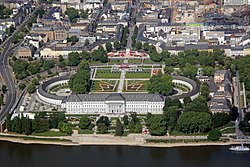

The Electoral Palace (German: Kurfürstliches Schloss) in Koblenz, was the residence of the last Archbishop and Elector of Trier, Clemens Wenceslaus of Saxony, who commissioned the building in the late 18th century. In the mid-19th century, the Prussian Crown Prince (later Emperor Wilhelm I) had his official residence there during his years as military governor of the Rhine Province and the Province of Westphalia. It now houses various offices of the federal government.
The Electoral Palace is one of the most important examples of the early French neoclassical great house in Southwestern Germany, and with Schloss Wilhelmshöhe in Kassel, the Prince Bishop's Palace in Münster and Ludwigsburg Palace, one of the last palaces built in Germany before the French Revolution.[1] Since 2002, it has been part of the Rhine Gorge UNESCO World Heritage Site,[1] and it is also a protected cultural property under the Hague Convention.
- ^ a b Ralf A. Flemming, Kurfürstliches Schloss, Structurae, retrieved 21 May 2013 (in German)